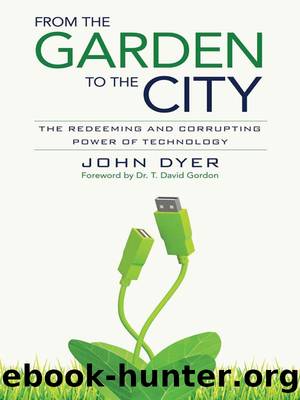From the Garden to the City by John Dyer

Author:John Dyer [Dyer, John]
Language: eng
Format: mobi
ISBN: 9780825426681
Publisher: Kregel Publications
Published: 2011-07-14T04:00:00+00:00
Make yourself an ark of gopher wood. Make rooms in the ark, and cover it inside and out with pitch. This is how you are to make it: the length of the ark 300 cubits, its breadth 50 cubits, and its height 30 cubits. Make a roof for the ark, and finish it to a cubit above, and set the door of the ark in its side. Make it with lower, second, and third decks. (Gen. 6:14–16)
Again, as one of the most well-known stories of the Bible, none of this feels out of the ordinary. But what’s happening is not too far removed from a science fiction movie, the kind where a kid finds the blueprints to an alien technology that can save the world. But there’s no alien here and no Hollywood special effects—this is the God of the universe telling Noah what kind of sealer to use on his boat. In what should come as a major surprise to us, it is through this human-made, God-designed ark—a technology created from the raw material of the earth—that humanity finds salvation from the floodwaters of God’s wrath. God certainly didn’t need the ark to save Noah and his family, but for some reason it was important for Noah to make it. Again we see that the word “make” (the same one used to describe Adam and Eve’s clothing) shows up repeatedly in this chapter, and the chapter ends with the words, “Noah made all that God had commanded” (Gen. 6:22).
When the floodwaters receded and Noah stepped out of the boat, it appeared that the human race would get a fresh start. God renewed his commands to be fruitful and multiply, and put in place the seeds of a formal government structure (Gen. 9:6) in hopes of preventing the kind of evil that was washed away in the great flood. Noah then planted a vineyard (Gen. 9:20), recalling images of the Garden of Eden and symbolizing a fresh start for humanity.
But even with this rebooting of the human race, Noah’s ark did not eradicate the virus of human sin. Sin had infected those caught in the floodwaters as well as the passengers of the ark. Even the ship’s captain, the hoped-for savior Noah, was hopelessly enslaved to sin. Almost immediately, we find that Noah’s sons tainted the fruits of his vineyard; and instead of cultivating and keeping it for God’s glory, they perverted it for their own sinful lusts (Gen. 9:21–24).
By the end of the story, it’s clear that Noah and his ark didn’t offer humanity the salvation for which Lamech had hoped. Of course, we wouldn’t expect technology to save us, yet this story seems to tell us that technology has redemptive capacity. It can offer us relief from suffering and, in some cases, help us avoid death.
Like the clothing God made in Eden, the ark temporarily protected humanity from some of the curses of the fall. But God didn’t just use the ark to relieve physical ailments, he also
Download
This site does not store any files on its server. We only index and link to content provided by other sites. Please contact the content providers to delete copyright contents if any and email us, we'll remove relevant links or contents immediately.
Kathy Andrews Collection by Kathy Andrews(10519)
The remains of the day by Kazuo Ishiguro(7551)
Spare by Prince Harry The Duke of Sussex(4195)
Paper Towns by Green John(4169)
The Body: A Guide for Occupants by Bill Bryson(3801)
Be in a Treehouse by Pete Nelson(3212)
Harry Potter and the Goblet Of Fire by J.K. Rowling(3045)
Goodbye Paradise(2962)
Never by Ken Follett(2880)
Into Thin Air by Jon Krakauer(2701)
The Remains of the Day by Kazuo Ishiguro(2618)
The Genius of Japanese Carpentry by Azby Brown(2609)
The Cellar by Natasha Preston(2595)
Drawing Shortcuts: Developing Quick Drawing Skills Using Today's Technology by Leggitt Jim(2532)
120 Days of Sodom by Marquis de Sade(2437)
Architecture 101 by Nicole Bridge(2350)
The Man Who Died Twice by Richard Osman(2298)
Machine Learning at Scale with H2O by Gregory Keys | David Whiting(2290)
Fairy Tale by Stephen King(2069)
